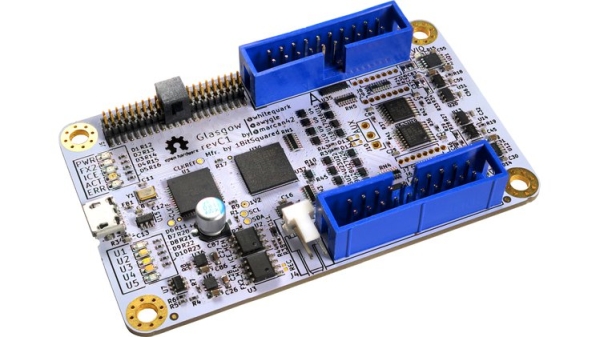A highly capable and extremely flexible open source multitool for digital electronics. Explore digital interfaces on ease.

What is Glasgow Interface Explorer?
Glasgow is a tool for exploring digital interfaces. It is designed for embedded developers, reverse engineers, digital archivists, electronics hobbyists, and anyone else who wants to communicate with a wide selection of digital devices while enjoying maximum reliability and minimum hassle. It can be attached to most devices without additional active or passive components, and it provides extensive protection from unexpected conditions and operator error.
The Glasgow hardware can support many digital interfaces because it uses reconfigurable logic. Instead of offering just a small selection of standard hardware supported interfaces, it uses an FPGA to adapt on the fly to the task at hand without compromising performance or reliability, even for unusual, custom or obsolete interfaces.
The Glasgow software is a set of building blocks designed to eliminate incidental complexity. Each interface is packaged into a self-contained applet that can be used directly from the command line or integrated into a more complex system. Using Glasgow does not require any programming knowledge, though it is much more powerful if you know a bit of Python.
Features
Below are a few of the tasks that Glasgow already performs quite well:
- Communicating via UART
- Automatically determining and following the baud rate of the device under test
- Initiating transactions via SPI or I²C
- Reading and writing 24-series EEPROMs
- Reading and writing 25-series Flash memories
- Determining memory parameters via SFDP
- Reading and writing ONFI-compatible Flash memories
- Determining memory parameters via ONFI parameter page
- Programming and verifying AVR microcontrollers with SPI interface
- Automatically determining unknown JTAG pinouts
- Playing back JTAG SVF files
- Debugging ARC processors via JTAG
- Debugging some MIPS processors via EJTAG
- Programming and verifying XC9500XL CPLDs via JTAG
- Synthesizing sound using a Yamaha OPL chip and playing it in real time on a webpage
- Reading raw modulated data from 5.25” and 3.5” floppy drives
- …and much more!
Everything above can be done with only a Glasgow revC board, some wires, and – depending on the device under test – external power. No additional frontend circuitry is needed.
Read more: GLASGOW INTERFACE EXPLORER FOR EXPLORING DIGITAL INTERFACES
